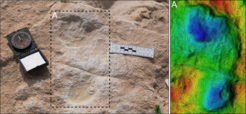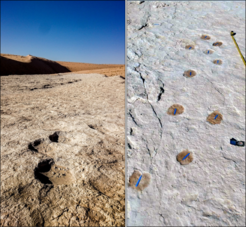Ancient Footprints Leave a Mark on 2020
The discovery of 120,000-year-old human, elephant and horse footprints near an ancient lakebed on the Arabian Peninsula changed what we know about what the world was like, and where our ancestors were, deep in prehistory

Amidst lockdowns, travel restrictions and the cancellation of many public events, humans around the world left many fewer footprints in 2020 than we’re used to. In a year otherwise filled with grim headlines, perhaps that’s one reason a study published in Science Advances last September made such an impact.
The study, led by researchers from the Max Planck Institutes for the Science of Human History and Chemical Ecology in Jena, Germany and partners at the Saudi Geological Survey and King Saud University, unveils fossilized footprints left by humans, elephants, horses, and other animals in a much wetter - and far greener - Arabian Peninsula some 120,000 years ago. The footprints are the earliest dated evidence for the presence of humans in this part of the world, contemporary with well-known human dispersals from Africa to the Levant.

The study joins other discoveries about prehistoric human mobility, new finds of hominin remains and novel insights from ancient DNA as one of the most exciting finds in human origins research for 2020. It was listed in Smithsonian Magazine’s Ten New Things We Learned About Human Origins in 2020, Live Science’s 10 Things We Learned About Our Human Ancestors in 2020, and PLOS’s Top 9 Discoveries in Human Evolution, 2020 Edition.
The Arabian Peninsula these trekkers passed through 120,000 years ago was much different than the landscape we see today, spotted with lakes and vegetation that would have been much more hospitable to early humans and the large mammals they relied on for food. Prior to this study, the earliest evidence of human presence in the Arabian Peninsula appears around 85,000 years ago.
To read the original open access article in Science Advances, click here.

